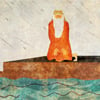It happened before: a world drowning in violence awaited redemption. Waited for divine action, because man had done all that was in his power and the rest was up to G‑d.
Man waited in a sealed ark, but the ark had a window. And from the window a dove was dispatched to circle the skies, to agitate the heavens with its restless reconnaissance. For the next four thousand years its spread wings and the olive leaf clutched in its beak would symbolize humanity’s quest for harmony and peace.
No, waiting is not a passive endeavor. On the threshold of redemption, we must open windows through which to look upon a harmonious tomorrow, and through which to dispatch winged emissaries to hasten the divine response from on high.
The Book of Genesis (chapters 6–8) relates the story of the great deluge which swept the earth in the dawn of human history.
Outside the ark that Noah had built and populated by divine command, the flood raged, the violent culmination of a violent world. Within, Noah presided over a miniature universe: his family; and—as G‑d had instructed him—“of all living things, two of each kind, a male and a female; and specimens of every food that is to be eaten . . . to keep seed alive on the face of the earth.”
For forty days and nights the rains fell, followed by five months in which the waters swelled and churned, cleansing the earth for the promise of a new beginning contained in the floating ark. Finally, the waters calmed and began to recede.
Noah then opened the window in the sealed ark and sent out a raven “to see if the waters had subsided from the surface of the earth.” The raven, which refused the mission, was followed by three doves: the first returned immediately, indicating that the flood’s waters still engulfed the earth; the second came back in the evening, clutching “a plucked olive leaf” and the promise of a new life for earth. The third did not return at all, informing the ark’s inhabitants that the earth was ready for habitation.
Why did Noah dispatch these winged emissaries? Obviously, he was eager to rebuild, to replace the mayhem of the flood with a new, harmonious world. However, it would seem that Noah would have had little use for whatever information these “reconnaissance flights” might provide him. In fact, even after he was convinced that the flood was over, Noah could not act on his own assessment that the earth was ready for a new beginning to take root. Noah had first entered the ark by the explicit command of G‑d, and as long as he did not receive further instructions to the contrary, the divine injunction, “Come into the ark,” remained in force. Only upon being commanded to “go out from the ark” and “be fruitful and multiply and fill the earth”—commands which came several weeks after the third dove’s mission—could he begin settling and developing the world outside the ark.
Hence the question: For what purpose did Noah dispatch the raven and the doves?
Contemporary Arks
Rabbi Israel Baal Shem Tov explains the relevance of the divine instruction to Noah, “Come into the ark,” to our daily lives. The Hebrew word for “ark,” teivah, also means “word.” Come into the word, says the Almighty to each and every one of us; enter within the words of prayer and Torah study. Here you will find a haven of wisdom, meaning and sanctity amidst the raging floodwaters of life.
The word that the Torah uses for the flood is mabul, which means disorder and confusion. Our world is a mabul of moral disarray and distorted priorities. But even as the chaos of a still unperfected world churns about us, we have the ability to create, as did Noah, an island of tranquility and perfection, sheltered by the protective words (teivot) of Torah and prayer.
Furthermore, the personal havens we create are not confined to the interior world of our minds and hearts. As was the case with Noah’s teivah, we also bring “specimens” from the outside world into the sanctity of our “ark.” Through our observance of the mitzvot, we employ a great variety of creatures and elements to fulfill G‑d’s will: the animal hide that is made into tefillin, the wool spun into tzitzit, the food which provides the energy to pray, the money given to charity. These are all “brought into the teivah”—made part of a personal universe that is wholly devoted to good and G‑dly pursuits.
But our personal arks are not ends in themselves. It is not sufficient to bring “samples” from the outside into the insulated havens of Torah and prayer, and content ourselves with these pockets of perfection adrift in a strife-torn world. Our “arks” must also serve as the seeds from which a new world, embracing the entirety of creation, will grow. Our mission in life is to create a world free of greed, jealousy and hate, a world suffused with the wisdom and goodness of its Creator; to translate the G‑dly perfection of our personal teivot into the divinely perfect world of Moshiach.
The directive, “Come into the ark,” which characterizes our task during the mabul-years of history, is but a prelude to the “go out from the ark” era of Moshiach, when the holiness and perfection of a Torah-defined existence will extend to all of creation.
Awaiting Word
As with Noah, we must await the word. It is not for us to decide that the era of Moshiach has begun. It is by G‑d’s command that we entered the “ark,” and it is He who will send Moshiach to herald the new dawn.
This may lead to the belief that we must passively wait for the redemption. Therein lies the lesson of Noah’s winged emissaries: well before he was commanded to “go out from the ark,” Noah opened a window to the outside world. As soon as he sensed signs of the flood’s abatement, he dispatched messengers to “test the waters” and confirm the fact that the world was ready for rebirth. Noah did not content himself with developing the inner world of the teivah while allowing history to take its course, but did everything in his power to establish the world’s readiness, thereby hastening the divine empowerment to make his ark a universal reality.
Today, we find ourselves at the same crossroads that Noah faced forty-one centuries ago. All around us, we detect signs of a world that is bettering and perfecting itself, beating its nuclear swords into the plowshares of aid to the hungry, and accepting the principles of freedom, justice and compassion as universal givens. Amidst this calming and abatement of the mabul’s waters, we cannot, and must not, closet ourselves in our insulated arks, concerning ourselves only with the perfection of our individual lives and communities, waiting for G‑d to send Moshiach. We must throw open the windows of our arks and reach out to a world that is shedding the turmoil of its mabul past. Our continued efforts to establish that the world is indeed ready for redemption will hasten the divine word from on high, instructing us that the era of universal peace is upon us.







Join the Discussion